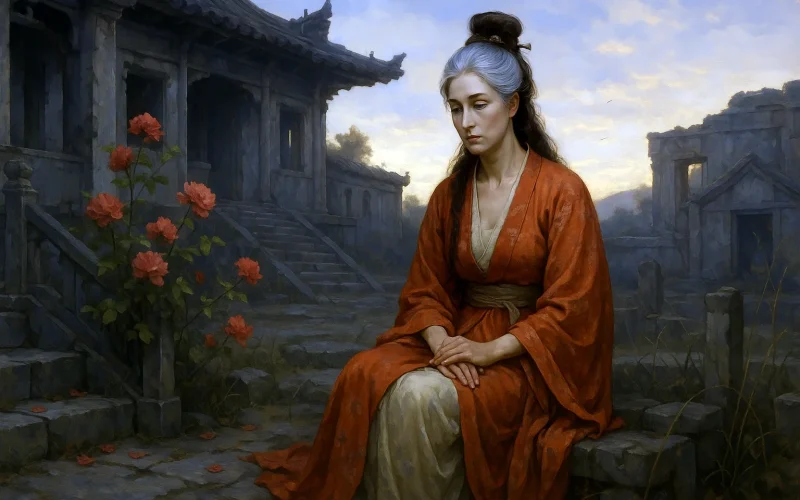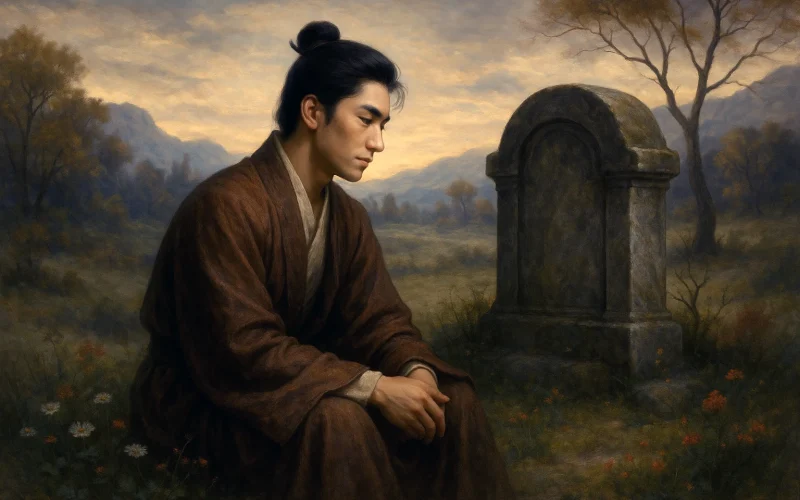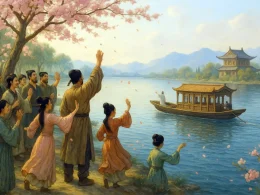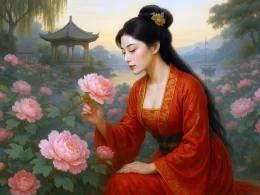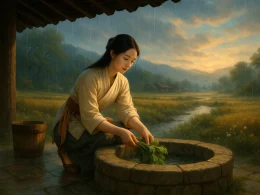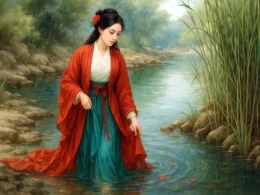In the faded old imperial palace,
Peonies are red, but no one comes to see them...
The ladies-in-waiting have grown white-haired
Debating the pomps of Emperor Xuanzong.
Original Poem
「行宫」
元稹
寥落古行宫,宫花寂寞红。
白头宫女在,闲坐说玄宗。
Interpretation
This poem was composed by Yuan Zhen while recalling the desolate scene of the abandoned Shangyang Palace in Luoyang during the Tang Dynasty. Once one of the most magnificent palaces during Emperor Xuanzong's reign, Shangyang Palace became a secluded place where many palace ladies were secretly confined after the Tianbao era, isolated from the outside world for over forty years. The poem vividly portrays these palace ladies who spent long, lonely years within these walls, expressing the poet's sympathy for their fate and his lament over the vicissitudes of prosperity and decline.
First Couplet: « 寥落古行宫,宫花寂寞红。 »
Liáoluò gǔ xínggōng, gōng huā jìmò hóng.
The ancient traveling palace stands desolate and still, While palace flowers bloom red in loneliness.
This couplet depicts the ruined palace and withering flowers, capturing the decay and solitude of the site. The word "desolate" (寥落) reveals the emptiness and abandonment, while "bloom red in loneliness" (宫花寂寞红) contrasts vibrant flowers with their寂寞 surroundings, reflecting the passage of time and resulting isolation. With concise yet profound language, the lines paint a vivid picture of the palace's fall from grandeur to desolation, creating a striking contrast between past splendor and present ruin.
Second Couplet: « 白头宫女在,闲坐说玄宗。 »
Báitóu gōngnǚ zài, xián zuò shuō Xuánzōng.
White-haired palace ladies remain, Idly sitting, speaking of Xuanzong.
Here, the elderly palace ladies are shown, aged by years of neglect. "White-haired" (白头) contrasts with the "red blooms" of the previous line, highlighting their transformation from youth to old age. Their idle chatter about Emperor Xuanzong's reign reflects both nostalgia for the past and the emptiness of their current existence. These lines poignantly portray the tragic fate of the palace ladies, who, like the flowers, have long lost their former vitality and brilliance.
Holistic Appreciation
In twenty crystalline syllables, Yuan Zhen constructs a diptych of imperial decline. The first panel reveals architecture surrendering to nature's quiet reconquest; the second shows human persistence amidst this decay. What emerges is not merely nostalgia, but a profound inquiry into memory's alchemy - how recollections of splendor both sustain and imprison the rememberer. The poet's genius lies in making absence palpable: the real subject is not what remains, but the magnificent void where history once resided.
Artistic Merits
This miniature masterpiece demonstrates how restraint amplifies resonance. Yuan Zhen employs the lightest touches - a blossom's hue, the cadence of old women's speech - to suggest entire lifetimes of unspoken longing. The composition's symmetrical structure (ruin/nature, age/memory) creates a perfect equipoise between observation and meditation. Most remarkably, the poet makes silence audible: between these lines hums the whisper of lost centuries.
Insights
Beyond its historical tableau, the poem offers timeless wisdom about the archaeology of memory. These handmaidens become mirrors for our own tendency to dwell in mental reconstructions of lost Edens. Their Xuanzong tales caution against confusing remembrance with living, while the enduring blossoms suggest beauty's quiet defiance of time. Ultimately, Yuan Zhen invites us to contemplate how gracefully we might become relics of our own brightest days.
Poem translator
Kiang Kanghu
About the poet
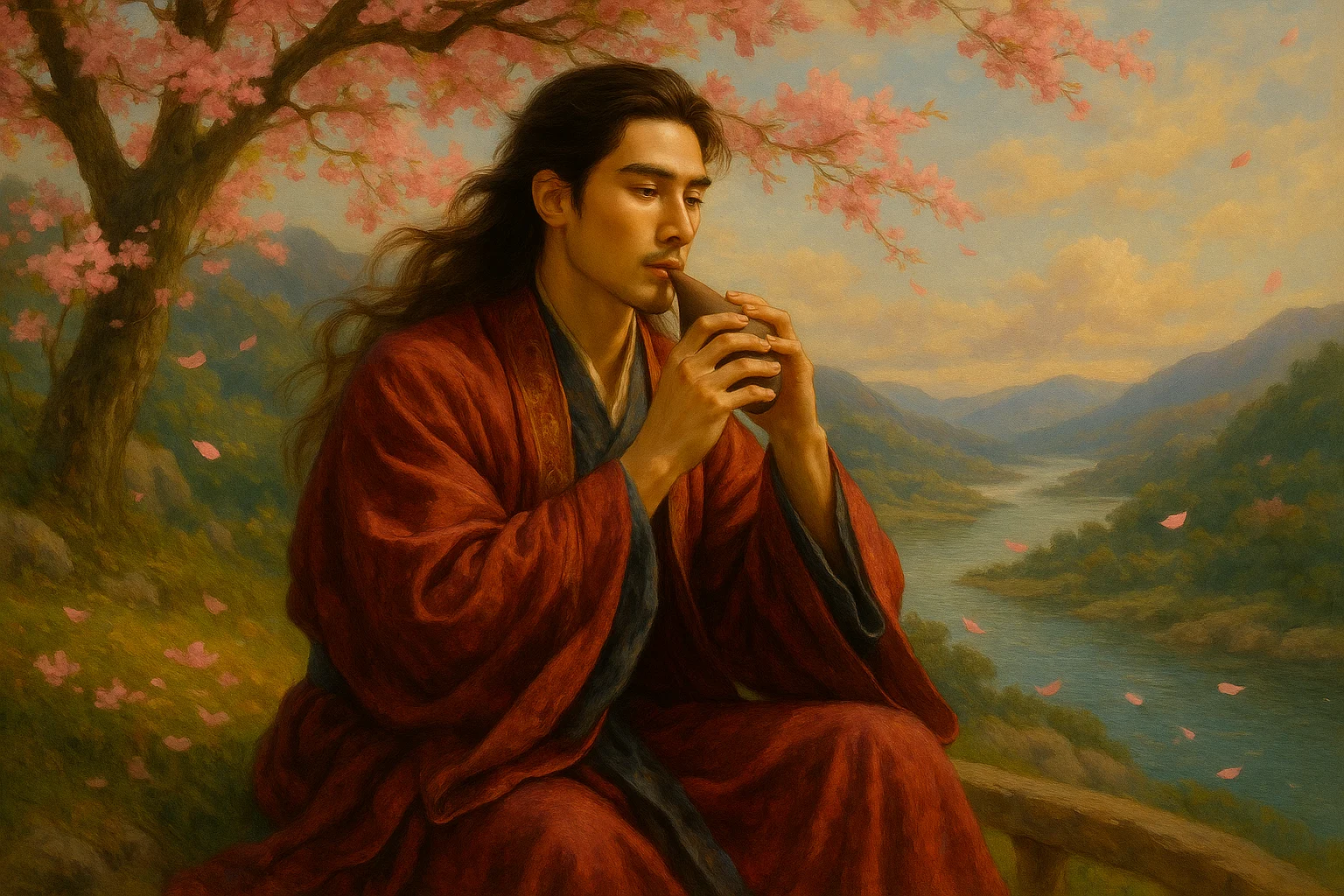
Yuan Zhen (元稹), 779 - 831 A.D., was a native of Luoyang, Henan Province, who was poor in his early years, but later became an official and finally died of a violent illness. He was friendly with Bai Juyi and often sang with him, and was known as “Yuan Bai”.






